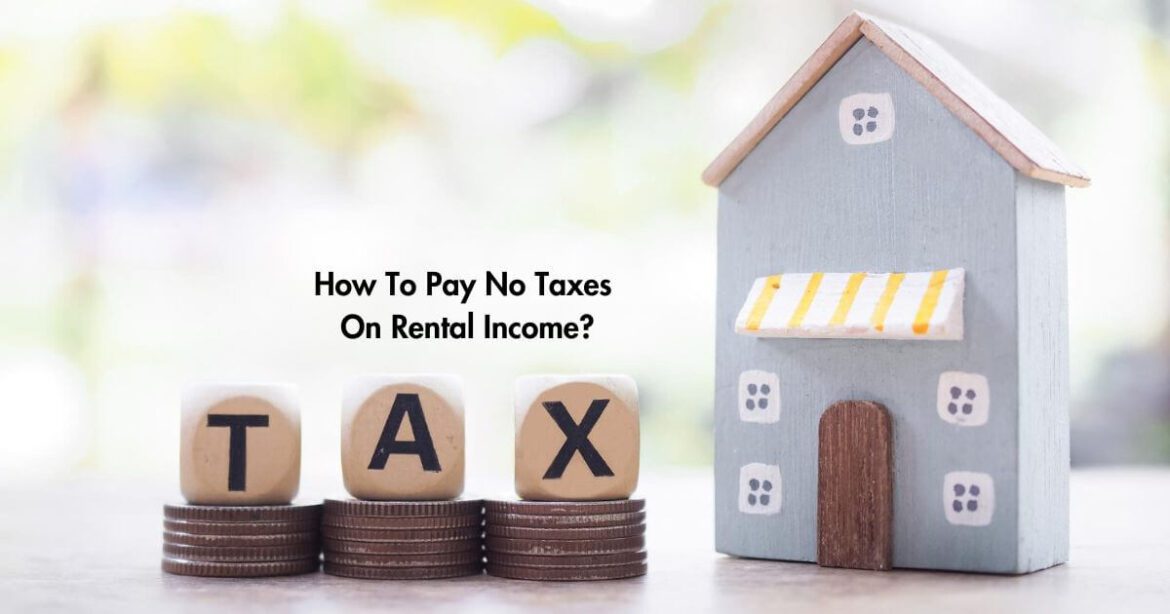Last Updated on June 5, 2025 by Amrita Das
Are you a real estate investor looking to maximize your profits from rental properties? Are you thinking if it is possible to pay no taxes on rental income? Yes, it is possible and this detailed guide will show you how.
By leveraging various real estate tax strategies such as postponing capital gains through a 1031 Exchange, safeguarding your gains with a self-directed IRA, and more strategies you can significantly reduce or even eliminate taxes on your rental income while remaining compliant with IRS rules.
Read this guide to find some tips for deferring taxes, minimizing liability, and increasing your ROI on rental properties. So, let’s dive in and learn how to pay no taxes on rental income.

You May Read: Do Churches Pay Property Tax?
How To Pay No Taxes On Rental Income?
Postponing Capital Gains through a 1031 Exchange
Real estate investors, are you looking for strategies to grow your portfolio while deferring capital gains taxes? The 1031 Exchange might be your answer.
This provision within the IRS tax code allows you to delay paying capital gains taxes on the sale of an investment property by reinvesting the proceeds into another ‘like-kind’ property.
What is a ‘Like-Kind’ Property?
In a 1031 Exchange, ‘like-kind’ refers to an investment property that shares the same asset class as the one you sold.
For example, if you’re selling a long-term residential rental, the proceeds must be reinvested into a similar type of property—not into a short-term rental or a commercial property.
Benefits of a 1031 Exchange
The chief benefit of a 1031 Exchange is the ability to defer capital gains taxes, which gives you more flexibility to grow your real estate portfolio.
By continually reinvesting into new properties through this exchange, you can defer capital gains taxes indefinitely—allowing your investments to accumulate value over time.
Important Considerations
To take full advantage of a 1031 Exchange, it’s essential to follow the IRS guidelines and deadlines diligently. From the point of sale, you have 45 days to identify potential replacement properties and 180 days to finalize the purchase of a replacement property.
Missing these critical deadlines could disqualify you from the tax-deferred benefit.
Limitations to Keep in Mind
While the 1031 Exchange is a powerful tool for tax deferral, remember that it only postpones your tax liability—it doesn’t eliminate it. When you eventually sell the property without utilizing a 1031 Exchange, you’ll be responsible for the full capital gains tax.
Safeguarding Your Gains with a Self-Directed IRA
A Self-Directed IRA (SDIRA) offers a unique opportunity to diversify your retirement savings by including alternative assets like real estate in your portfolio.
This approach allows you to tap into the growth potential of real estate investments while enjoying the tax advantages associated with Roth or Traditional IRAs.
Why Real Estate Investors Favor SDIRAs
- Enhanced Control: With an SDIRA, you have greater control over your investment choices, enabling you to expand your retirement portfolio beyond the usual stocks and bonds.
- Tax-Advantaged Growth: Particularly with a Roth SDIRA, any gains from your investments grow tax-free, providing a significant boost to your wealth accumulation strategy for retirement.
Key Considerations for Setting Up an SDIRA
- Choosing the Right Custodian: Establishing a Self-Directed IRA starts with selecting a custodian who specializes in alternative investments. They play a crucial role in advising you on permissible transactions and ensuring your compliance with IRS regulations.
- Understanding the Regulations: SDIRAs are governed by strict rules to preserve their tax-deferred or tax-free status. Navigating these regulations is essential to maintain the benefits of using this powerful retirement savings vehicle.
Borrowing Against Your Property’s Equity
Investing in real estate has its challenges, and one of the key issues is illiquidity. Often, your investment remains tied up in the property until it’s sold, and that process comes with its own set of fees and taxes.
But there’s good news for property owners. You can tap into the value of your property without selling it through borrowing against equity. This involves securing a loan or line of credit using your property’s equity as collateral.
Why Borrow Against Equity?
By leveraging your property’s equity, you can access funds for future investments without immediately facing tax liabilities such as capital gains, offering a flexible cash source for various needs—from home improvements to expanding your investment portfolio.
Advantages for Real Estate Investors
- Quick Capital Access: This approach provides property owners with rapid access to needed funds for property maintenance or investment diversification, all while avoiding immediate tax implications.
- Preserve Tax Benefits: By minimizing taxable income, investors can maximize the benefits of their rental property and also can use its value for financial flexibility. This not only allows them to retain more of their profits but also allows them to make strategic decisions about their property’s worth.
Things to Consider
- Repayment Responsibility: While you won’t face taxes on borrowed funds, the loan must eventually be repaid. It’s important to evaluate how this will affect your cash flow and broader financial plans.
- Risk Awareness: Borrowing against your equity can boost your total leverage, thereby increasing the risk level of your investment portfolio. Investors need to weigh these risks carefully and consult with a licensed financial advisor to explore strategies for minimizing them.
Maximizing Tax Benefits through Depreciation
Depreciation is one of the most potent tools for rental property owners when it comes to tax savings. This strategy lets you reduce your taxable rental income by considering your investment properties’ gradual wear and tear over time.
The IRS provides property owners with the opportunity to deduct the value of their investment properties (excluding land) over its ‘useful life’. This deduction is considered an expense, effectively lowering the taxable income generated from rental properties.
Important Considerations
- Depreciable Components: Only certain elements of a property can be depreciated. While the land itself is non-depreciable, structures and improvements are, provided they follow IRS guidelines.
- Depreciation Schedules: These vary between residential and commercial properties. Residential properties usually have a ‘useful life’ of 27.5 years, whereas commercial properties span 39 years.
Strategies to Maximize Depreciation Deductions
Accelerated Depreciation
Conducting a cost segregation study can be an effective way to maximize depreciation benefits. This study allows property owners to identify and separate non-fixed components of the property, enabling them to depreciate these parts separately over their designated useful lives as per IRS guidelines.
By employing this strategy, investors can claim more depreciation in the initial years of property ownership.
Maintain Detailed Records
Keeping thorough records of all property-related expenses, improvements, and depreciation schedules is essential. Utilizing software can help in maintaining organized records, which is vital for maximizing depreciation deductions and making sure to comply with IRS requirements.

Utilizing Deductions to Maximize Rental Property Profitability
Claiming every available deduction is crucial for maximizing the profitability of rental property investments. This not only helps reduce taxable rental income, but it also ensures that property owners are able to take advantage of all tax benefits.
To effectively claim deductions, it is essential to maintain meticulous records and keep track of all deductible expenses, such as operating expenses like property management fees, maintenance and repairs, insurance premiums, property taxes, and utilities.
Other deductible expenses include travel costs related to managing and maintaining the property, professional fees paid to lawyers or accountants, and the home office deduction for those who use a portion of their home solely for managing the rental properties.
Managing Your Properties in an Active Way
Managing your rental properties can provide significant financial benefits, especially when it comes to tax deductions. By taking on daily operations, maintenance tasks, and tenant interactions yourself, you may be able to deduct a portion of rental losses against other forms of income.
However, to qualify as a real estate professional under IRS rules, you must meet certain criteria. This includes spending more than 750 hours per year actively managing your properties as your primary source of income and having over 50% of your personal services performed in the real estate industry.
It is also important to note that passive investors typically do not meet these criteria and therefore cannot take advantage of the same tax benefits.
So if you are looking to actively manage your properties and reap the financial rewards, be sure to keep detailed records of all your real estate activities and track your hours closely.
This will not only help you qualify as a real estate professional but also ensure that you are maximizing your deductions come tax time.
Maximize Your Investment by Deducting Property Taxes
For property owners, property taxes can be a hefty expense. Fortunately, the IRS allows you to deduct these expenses from your rental income, offering a valuable opportunity to save. This deduction covers all property taxes paid within the tax year, regardless of how they are calculated or assessed.
Whether it’s based on the assessed value of your property or determined through local or state assessments, you can deduct these payments and lower your taxable income.
By leveraging these deductions, not only can you save money on your tax bill, but also make your rental property investment more financially sound.
It’s important to keep thorough records and proof of your property tax payments in order to take advantage of this deduction and maximize its benefits.
Claim Your Mortgage Interest Deduction
Taking a mortgage interest deduction can be a valuable tool for rental property owners to reduce their tax liability. This deduction allows you to deduct the interest paid on any loans used for purchasing, building, or improving your rental property from your taxable rental income.
It is important to note that this deduction only applies to the interest portion of your mortgage payments, not the principal amount. This means that you cannot deduct the entire mortgage payment, but only the interest portion.
However, The IRS also has specific limitations and it is crucial to have a thorough understanding of these limitations and requirements to ensure you are accurately claiming this deduction and maximizing your tax savings.
The Benefits of Hiring a Certified Public Accountant (CPA) for Real Estate Taxes
Hiring a Certified Public Accountant (CPA) is essential for any real estate investor looking to navigate the complex world of rental property taxes.
With their specialized knowledge and expertise in real estate tax laws, CPAs can provide invaluable assistance in identifying and utilizing all available deductions to maximize tax savings.
They can also develop strategic tax plans tailored to your specific needs and goals, ensuring that you are not overpaying on taxes or missing out on potential opportunities for savings.
Additionally, CPAs are well-versed in navigating complicated processes such as 1031 exchanges and provide assistance and advice regarding the changing tax landscape throughout the year.
By hiring a CPA, investors can rest assured that their assets will be protected and structured most tax-efficiently, ultimately avoiding costly IRS audits and remaining compliant with strict regulations.
Read More: Tax Consequences Of Transferring Property To LLC | Learn Step-By-Step
How to Pay No Taxes on Rental Income: FAQ’s
Q: What are some ways to reduce taxable rental income in California?
A: While California does not have any specific exemptions for rental income, there are various deductions that can be used to lower the taxable amount. These include depreciation, mortgage interest, property taxes, and other qualified expenses, similar to those available on a federal level.
Q: Is it possible to completely eliminate taxes on rental income?
A: While it may not be possible to eliminate them entirely, there are strategies that can be implemented to reduce tax liabilities and increase returns from rental properties for long-term success.
Q: How can poor bookkeeping systems affect real estate investors?
A: Poor bookkeeping systems can have a significant impact on real estate investors by causing them to miss out on valuable deductions.
Without accurate and organized records of income and expenses, investors may not be able to claim all the deductions they are entitled to, leading to potential financial losses.
Q: Can I deduct rental losses against other forms of income?
A: Yes, as long as you meet the criteria to qualify as a real estate professional and actively manage your properties.
Q: How can I maximize my deductions for property taxes?
A: Keep thorough records and proof of your property tax payments in order to accurately claim this deduction and lower your taxable income.
Q: Can hiring a CPA help me save on taxes for my rental income?
A: Yes, a Certified Public Accountant (CPA) who specializes in real estate taxes can provide expert guidance and develop strategic tax plans to help you minimize tax liabilities and increase returns from your rental properties.
Read More: How Are Annuities Given Favorable Tax Treatment?
How to Pay No Taxes on Rental Income? Conclusion
While it may not be possible to completely eliminate taxes on rental income, several effective strategies can greatly reduce your tax liabilities and increase your returns from rental property investments.
By staying informed, leveraging available tax benefits, and seeking expert guidance, you can optimize the financial potential of your rental properties and keep more of your hard-earned income in your pocket.
Remember to consult with a qualified professional to ensure compliance with tax laws and make the most out of available deductions. With these approaches in place, you can minimize tax burdens and maximize profits from your rental properties for long-term success.
Hence, start implementing these strategies today to achieve the goal of paying little or no taxes on rental income. Thank you for reading this detailed guide “How to pay no taxes on rental income?”
